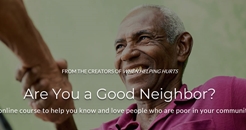 Empty-handed ministers - 2
Empty-handed ministers - 2
When Helping Hurts is a very thought-provoking book.
Originally published in 2009 and revised subsequently for a new edition, it examines the church's mission to help the poor.
The book is in four parts:
-
the mission of the church and the Christian view of poverty
-
discussion on poverty and examples of harmful poverty alleviation
-
strategies for addressing poverty
-
bringing about real change in church and community.
Looking at poverty definition, the middle class or those with wealth tend to define it as lack of wealth or material goods. The poor tend to describe their circumstances using words such as Shame, Fear, Unhappiness, Depression, Inferiority, Powerlessness, Dissatisfaction, Voicelessness. This points to a much more holistic definition of poverty. Poverty is not just a lack of money. It is not just hunger and need for shelter or clothing. Many poor people are plagued with social and spiritual poverty, and their view of their value is also affected.
"Poverty is the result of relationships that do not work, that are not just, that are not for life, that are not harmonious or enjoyable. Poverty is the absence of shalom in all its meanings." Bryant Myers.
A majority middle class church could focus on resolving problems with money or goods. The giving of material things isn’t bad, but it isn’t always good. This can cause a harmful cycle which reinforces the poor people's sense of inferiority and lack of self-esteem, which in turn increases the original problem. Not only that, it creates paternalism where outside workers provide the "only" answer.
Sadly, this approach can also bring into question our motivations. Is there a certain element of personal gratification and relieving of conscience? In other words, we do this because it helps us feel good?
“Poverty is rooted in broken relationships, so the solution to poverty is rooted in the power of Jesus’ death and resurrection to put all things into right relationship again” Authors of ‘When Helping Hurts’
To help work through these issues, the creators of 'When Helping Hurts' have created an online course, 'Are You a Good Neighbour?'
It is designed to help you know and love people who are poor in your community.
Here are some details:
Do you want to help people in poverty, but feel like you’re not making a difference? Are you frustrated with the way your church or ministry tries to help people? Do you feel disconnected from people and communities that need help? You’re not alone.
Helping the poor is about friendships—people walking with people.
Bestselling book When Helping Hurts changed the way thousands of individuals, churches, and ministries think about poverty. Poverty isn’t about a lack of stuff—it’s the result of broken relationships. By walking alongside people who are poor, we can all experience the healing power of Jesus in our broken relationships.
As society grows increasingly divided along socioeconomic lines, it’s easy to find yourself living, working, and worshipping with people just like you. When that happens, you miss out on the chance to live out the Kingdom of God.
Are You a Good Neighbour? is an online course designed to help you apply the principles of helping without hurting in everyday life—and take the first steps toward building personal relationships with people in poverty.
Through this course, you’ll learn how to:
-
Help the poor in a better way
-
Discover why healthy, two-way relationships are an important key to effectively helping people in poverty.
-
Break out of the status quo
-
Transform your heart, change your everyday habits, and improve your ministry with the poor.
-
Take practical action
Why not use this for small groups for a season?
See also the following blogs:
Bridges out of Poverty
Hidden rules among classes
Seven steps to become a church for and of the poor
A Church for the Poor
Church for the poor research
Retweet about this article:
Geoff Knott, 03/04/2018